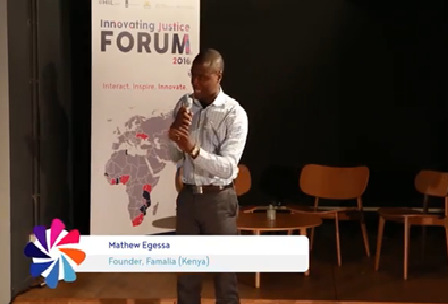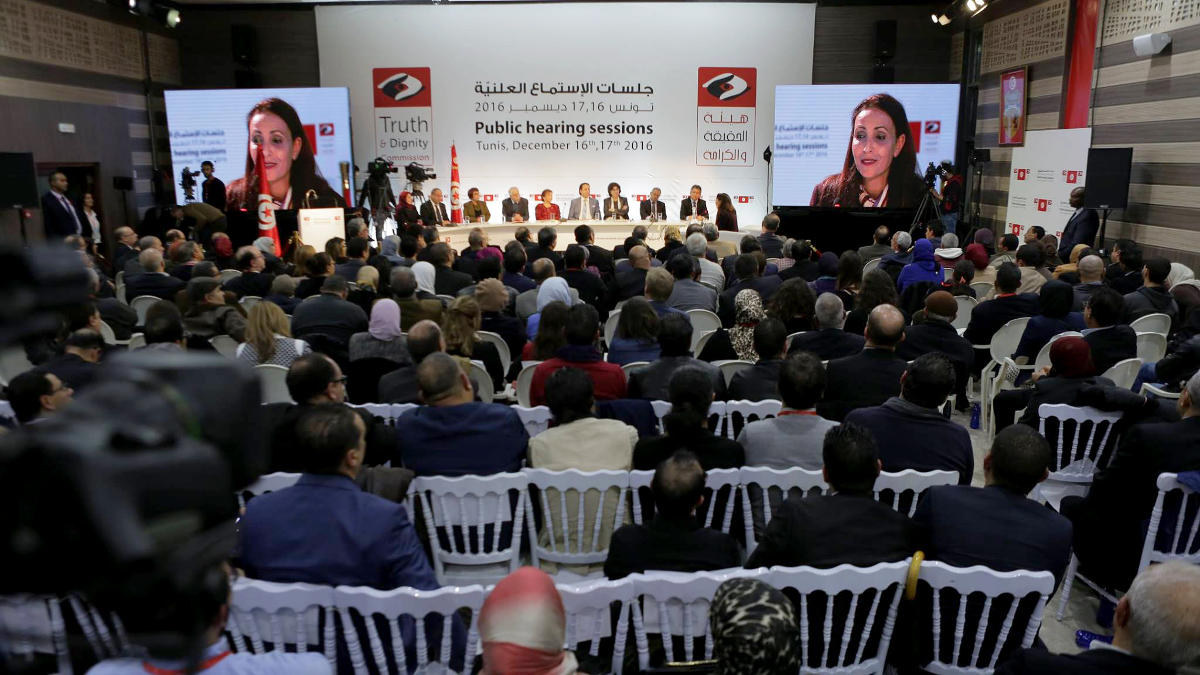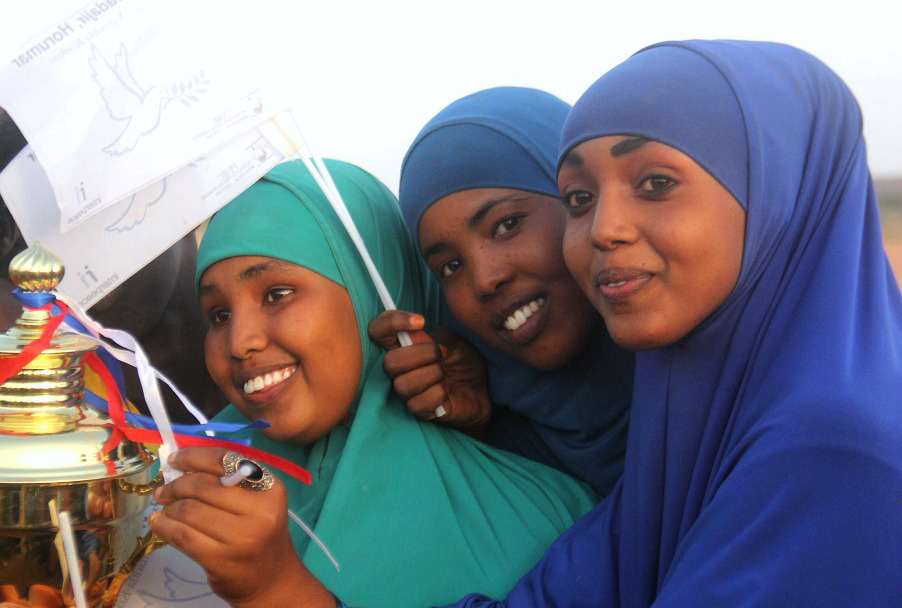Select indicator
 Human Security
Human Security
In fragile and conflict-affected states, the Netherlands aims to improve the security of all citizens, by increasing the responsiveness of security institutions to the security needs of citizens and by promoting the contributions of communities and civil society to citizens' security.
Area of land cleared of explosive remnants of war
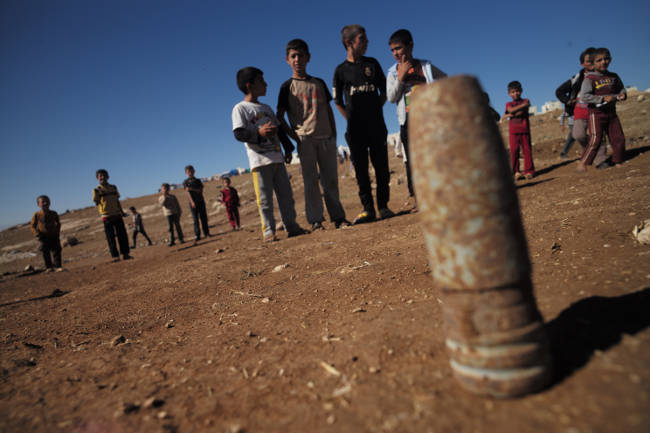
In Iraq in 2016, the Mines Advisory Group (MAG) cleared 778,344 m2 of explosive remnants of war (ERW) and educated thousands of children on the risks of ERW (photo: MAG).
What does this indicator mean?
Even years after the end of an armed conflict, landmines, cluster munitions and other explosive remnants of war (ERW) often pose a great safety threat to people.
This indicator measures the number of square metres (m2) of land cleared of ERW. Clearing land that is contaminated with ERW, such as landmines, lays a foundation for stability and contributes to the physical security of people. Contaminated land causes significant security threats and causes fear among people of losing their livestock, limbs or lives. Contamination with ERW is a strain on reconstruction after a conflict and prevents refugees and internally displaced people from returning home safely or from using agricultural land or roads.
What does the result mean?
In 2016, the Netherlands sustained its contributions to efforts to create a world free of the threat of mines and explosive remnants of war (ERW).
The area cleared of ERW decreased in 2016 slightly compared to previous years, as previous Dutch-funded demining programmes came to an end by mid-2016 and a new Mine Action Programme (2016-2020) was started up in the second half of 2016 in 13 countries (e.g. Afghanistan, Iraq and South Sudan).
Besides clearing land, implementing partners destructed stockpiles of explosives and provided mine-risk education to more than 496,000 people and victim assistance to over 6,300 people. They also stimulated socio-economic development, e.g. by training and employing at least 1,890 people from local communities. In Colombia, partners contributed to the reintegration of ex-FARC militants by employing them alongside members of local communities.
 Human Security
Human Security
In fragile and conflict-affected states, the Netherlands aims to improve the security of all citizens, by increasing the responsiveness of security institutions to the security needs of citizens and by promoting the contributions of communities and civil society to citizens' security.
Number of professionals trained to contribute to human security
Professionals trained
What does this indicator mean?
This indicator presents the combined number of professionals trained in the field of human security. It includes peacekeepers, police officers and experts in security sector reform (SSR), community policing or mine action. Thanks to such trainings, these professionals contribute (better and more effectively) to the safety and security of civilians.
What does the result mean?
Citizens of war-torn Syria live under the constant threat of attack. Protection of and assistance to the population is crucial. Equally important to their security are the policing activities performed by Free Syrian Police officers in opposition-held territories, through the Access to Justice and Community Security (AJACS) programme. In 2016, 2,580 new police officers were trained.
In 2016, the Netherlands continued its support to the African Contingency Operations Training and Assistance (ACOTA) programme, in partnership with the US. This training enabled more than 5,000 African peacekeepers, of which 368 were women, to serve in peacekeeping missions worldwide.
Additionally, the Netherlands funded a Female Military Officers Course (FMOC) for 38 female military officers from countries contributing troops to UN peacekeeping missions. The course was organised by UN Women. Since the introduction of the FMOC, the percentage of female military officers deployed in missions has more than doubled from 3.6% in 2014 to 7.5% in 2017.
 Rule of Law
Rule of Law
Access to an effective, fair and legitimate justice system, whether formal or informal, enables people to peacefully settle disputes, prevents further conflict and facilitates development and economic prosperity.
People benefiting from access to justice
The above video features the 2016 Innovating Justice Forum organised by HiiL. One of the innovations chosen for upscaling is ‘Familia’, which offers SMS-based solutions for property transfer in Kenya, combining technology with access to justice. HiiL is one of our partners and seeks to develop innovative solutions to address citizens’ justice needs.
What does this indicator mean?
Enhancing and increasing access to justice for men and women is part of a broader citizen-based approach taken by the Netherlands. This allows people to seek redress for their concrete problems and justice needs.
The indicator measures the number of people with access to justice, through formal or informal institutions, to resolve disputes in fragile or conflict-affected states.
Access means the actual use of different legal mechanisms or proceedings, from filing complaints to resolving disputes.
What does the result mean?
The Netherlands supports the access of people to justice through formal or informal justice systems in various countries, including Afghanistan, Mali, Palestinian Territories, Rwanda, South Sudan and Uganda. In Afghanistan, many women (87%) experience violence in their lifetime. With Dutch support, UNDP established a pilot ‘Elimination of Violence Against Women Court’ in Kabul. In 2016, the court heard 174 cases. Verdicts were issued in 62% of the cases.
The Netherlands also supported justice initiatives in the Palestinian Territories. The Sawasya programme, for example, provided legal aid to 28,000 people of which 98% reported to be satisfied with the service.
In addition, the Netherlands funded research to identify the legal problems of citizens in daily life. For example, the Hague Institute for Innovation of Law (HiiL) and UNDP undertook such justice surveys in Uganda and Ukraine, respectively.
 Rule of Law
Rule of Law
Access to an effective, fair and legitimate justice system, whether formal or informal, enables people to peacefully settle disputes, prevents further conflict and facilitates development and economic prosperity.
Strengthened justice institutions, including courts and police
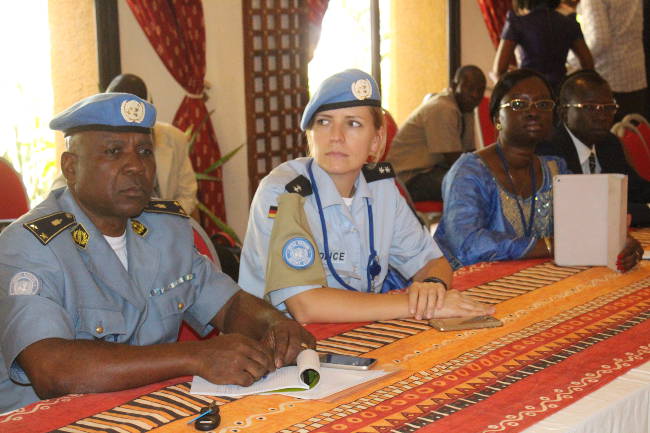
The Netherlands assisted with law and policy reform relating to the justice sector in 14 countries: Afghanistan, the CAR, Colombia, Indonesia, Kenya, Lebanon, Libya, Mali, the Palestinian Territories, Rwanda, Somalia, South Sudan, Tunisia and Uganda. The above photo shows the launch of a criminal justice project implemented by one of our partners, IDLO. This project aims to strengthen the criminal justice chain (i.e. police, courts and prisons) in the north of Mali by empowering Malians to identify local priorities related to accessible criminal justice. The project then seeks local solutions to these problems (photo: IDLO).
What does this indicator mean?
A functioning legal system and effective, transparent justice institutions are key preconditions for a sustainable legal order.
This indicator measures the number of justice institutions strengthened in terms of fairness, effectiveness, accountability or independence.
Justice institutions include a range of institutions that seek to provide justice and can consist of formal state institutions (i.e. courts or the police) or informal non-state institutions (i.e. community leaders or alternative dispute-resolution mechanisms).
What does the result mean?
To work towards more legitimate justice institutions, in 2016 the Netherlands funded the human rights training of Ethiopian police officers (Justice For All).
The Netherlands also invested in the construction of community schools of justice in Indonesia (LBH APIK). This enables women to better claim their rights.
To enhance the effectiveness of judicial institutions, an electronic case management system was fully implemented by MINIJUST in Kigali, Rwanda. Similarly, in Uganda the Human Rights Commission was further strengthened (JLOS), as were 24 justice institutions in Mali (IDLO).
 Rule of Law
Rule of Law
Access to an effective, fair and legitimate justice system, whether formal or informal, enables people to peacefully settle disputes, prevents further conflict and facilitates development and economic prosperity.
Victims participating in transitional justice mechanisms
In Tunisia, the Truth and Dignity Commission held public hearings, which were widely aired in the media, supported by ICTJ and UNDP. The commission took statements on human rights violations from 37,200 men and 8,800 women. The Netherlands contributed to this process through one of its partners, the ICTJ.
What does this indicator mean?
Conflicts can leave societies devastated and lay waste to institutions. In the aftermath of massive, widespread human rights violations, victims may therefore need special transitional justice measures to seek redress for crimes and human rights violations and address root causes of conflict.
This indicator measures the actual number of victims that have participated in transitional justice mechanisms. Examples of such mechanisms include truth-seeking inquiries, criminal prosecution of the most responsible perpetrators, reparations and the reform of laws and institutions.
What does the result mean?
2016 was an important year in terms of transitional justice and accountability for massive human rights violations in countries such as Colombia, Tunisia and Syria.
After decades of civil war in Colombia, a historic peace agreement with the FARC was signed in November 2016. The International Centre for Transitional Justice (ICTJ), a partner of the Netherlands, provides support to the peace process and is mentioned in the final peace agreement as one of the key organisations for monitoring its implementation. In Colombia, 82,000 victims participated in transitional justice mechanisms and 12 perpetrators were held accountable.
In Tunisia, the Truth and Dignity Commission took statements on human rights violations from 37,200 men and 8,800 women. ICTJ provided support for women’s participation, as well as contributing to the overall process.
The Netherlands also supported steps towards transitional justice in Syria and in the Central African Republic. In Syria, the Netherlands supported the establishment of the International Independent Impartial Mechanism, which will investigate war crimes and crimes against humanity. The Special Criminal Court in CAR held its first public information session.
 Peace Processes & Political Governance
Peace Processes & Political Governance
The Netherlands contributes to peace and state building efforts in fragile countries to support the resilience of the state, society and community. These efforts are tailored to the needs and context of each society, to build inclusive sustainable states, accountable and transparent institutions, participatory decision-making processes and public access to information. Ultimately, this will contribute to the stability of a country.
Groups and mediators trained in negotiation skills
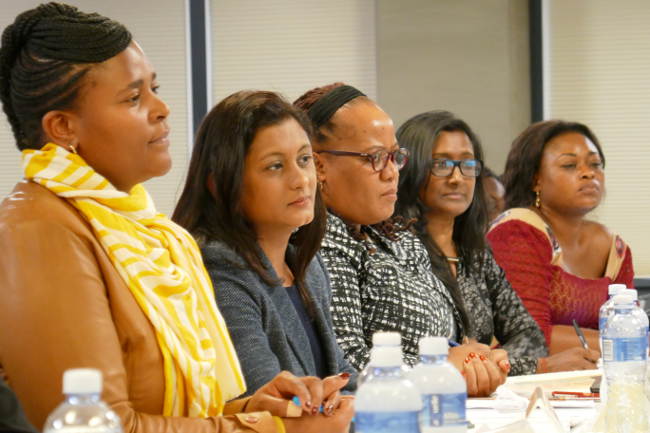
Participants take part in simulation and role-playing exercises to improve their mediation skills and resolve conflicts (photo: Clingendael).
What does this indicator mean?
Mediation and negotiations skills are essential to promote the peaceful resolution of conflict. When people that are involved in a conflict learn to discuss their grievances, rather than fight about them, the chances of a peaceful resolution are enhanced.
What does the result mean?
In 2016, 559 mediators and negotiators from across the world were trained through the Mediation Facility of the Netherlands Institute of International Relations ‘Clingendael’. This government-supported facility was established in 2015. Participants are better equipped to mediate or negotiate effectively towards a settlement in various types of conflicts and situations.
An example is a training course set up in collaboration with the African Union, involving 20 women from different African countries. They were trained to mediate in different scenarios, such as local conflicts, complex international conflicts and conflicts between multiple parties.
 Peace Processes & Political Governance
Peace Processes & Political Governance
The Netherlands contributes to peace and state building efforts in fragile countries to support the resilience of the state, society and community. These efforts are tailored to the needs and context of each society, to build inclusive sustainable states, accountable and transparent institutions, participatory decision-making processes and public access to information. Ultimately, this will contribute to the stability of a country.
Inclusivity for stability
Interpeace supports peace-building processes in over 20 countries.
What does this indicator mean?
Governments and institutions gain legitimacy when various actors from society are included and take part in state building processes.
The Netherlands therefore supports state building efforts which involve inclusive and participatory decision-making processes so that the concerns or grievances of all stakeholders are taken into account by their political leaders and government.
What does the result mean?
States in which people feel represented by and have confidence in their governments and institutions, are key to building resilience, addressing conflict and enhancing the stability of a country. Partners supported by the Netherlands acknowledge the importance of inclusive peace and state building.
With Dutch support, Interpeace facilitated the establishment of a civil peace accord in Jenin, one of the most violent towns on the northern West Bank of the Palestinian Territories. This agreement included more than 1,000 signatures from stakeholders in the conflict. The inclusive approach led to a commitment to reduce all forms of division and internal violence (both criminally and politically inspired), to recognise the importance of the rule of law and to remove clan protection. This civil peace accord was considered the most constructive approach to reduce internal violence and an important step towards reconciliation.
Interpeace also worked with the National Police in Colombia to develop a national strategy that defines the role of the police in the implementation of the peace agreement. In a survey conducted as part of this support, 126,000 police officers shared their views on the agreement and their role.
 Peace Processes & Political Governance
Peace Processes & Political Governance
The Netherlands contributes to peace and state building efforts in fragile countries to support the resilience of the state, society and community. These efforts are tailored to the needs and context of each society, to build inclusive sustainable states, accountable and transparent institutions, participatory decision-making processes and public access to information. Ultimately, this will contribute to the stability of a country.
Improved (local) government capacity for fair and efficient implementation of laws and policies
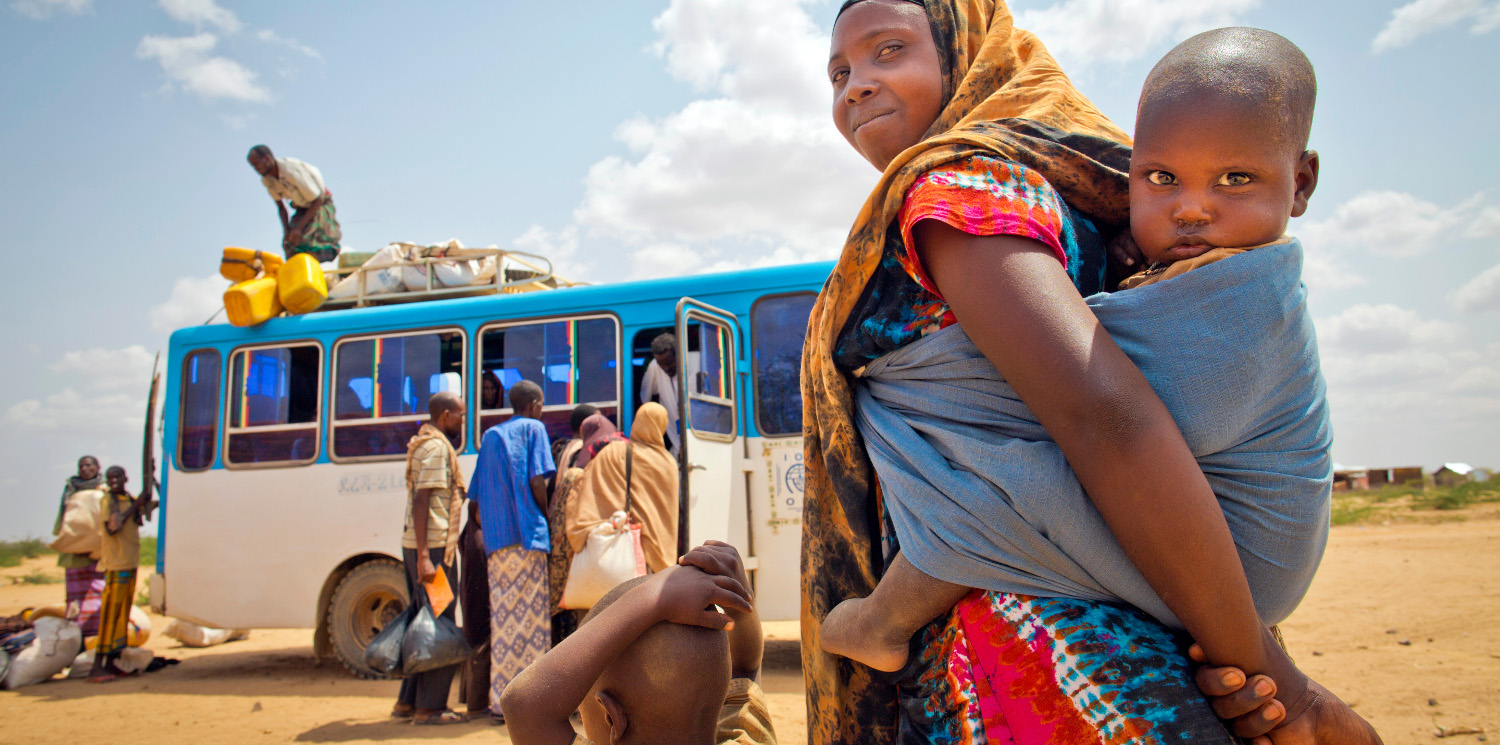
Somali refugees in Dolo Ado in Ethiopia.
What does this indicator mean?
Government capacity for the fair, transparant and efficient implementation of laws and policies is crucial to reduce conflict and promote sustainable development. It improves the relationship between citizens and their governments.
What does the result mean?
Through its partners, the Netherlands supports efforts to strengthen (local) government to become more inclusive, accountable and responsive to public needs in fragile and developing countries, such as South Sudan, Somalia, Afghanistan, Pakistan and the Philippines. Such efforts include the empowerment of people, specifically women, to become involved in decision-making and dialogue with government institutions.
In Somalia, European Parliamentarians With Africa (AWEPA) empowered women as political leaders. The women acquired effective lobbying and advocacy skills, which enabled them to successfully demand action from their government. In this way, Somali women have been able to overcome fear, stand up to traditional biases and put themselves forward as candidates for election to parliament. Thanks to the momentum built by the project, along with other efforts, female representation in the Federal Parliament of Somalia increased from 14% to 24% of all seats.
Furthermore, thanks in part to the policy recommendations of Oxfam Novib's Citizens First programme to the Ministry of Health in Sindh, Pakistan, the provincial government decided to increase its health budget by 13.7 %.
 Social and Economic Reconstruction
Social and Economic Reconstruction
Stimulating marginalised people’s ability to generate an income and gain access to basic services, such as clean water or education, in order to address the root causes of instability, conflict and irregular migration.
People with an improved income in fragile and conflict-affected states (FCAS)

Congo Call Centre is the first independent call centre in the Democratic Republic of Congo. It is supported by the Netherlands-supported International Finance Corporation, which provides risk capital and management skills training to entrepreneurs in difficult markets in Africa (photo: IFC).
What does this indicator mean?
Unequal access to opportunities to generate a decent income is a root cause of instability, conflict and irregular migration in fragile and conflict-affected states.
We therefore measure not only how many of our beneficiaries have received training, assets or other support to boost (self-)employment or livelihoods, but also how many have subsequently become employed or earned a better income.
What does the result mean?
The Netherlands strives to reduce the grievances of marginalised groups which perceive that they have less access than others to opportunities to generate an income. In various fragile and conflict-affected states, people, companies and governments are therefore supported through training, capacity building, access to finance (loans), labour market matchmaking and resources, such as tools or seeds.
Support to the World Bank Group, for example, resulted in the creation of more than 31,000 jobs and thousands of loans to entrepreneurs in 13 fragile and conflict-affected African states.
Dutch-supported NGO programmes in countries such as Burundi, Congo, DRC and Mali helped more than 45,000 people gain a better income. One such person is Salvator Ntukamazina, who runs a small bakery near the village of Rumonge, in Burundi. His bakery was set up - with support from Dutch NGO Spark - by a diverse group of 15 investors and employees, among which ex-combatants and returned refugees, who are now able to better support their families.
 Social and Economic Reconstruction
Social and Economic Reconstruction
Stimulating marginalised people’s ability to generate an income and gain access to basic services, such as clean water or education, in order to address the root causes of instability, conflict and irregular migration.
People using new or improved water points in fragile and conflict-affected areas
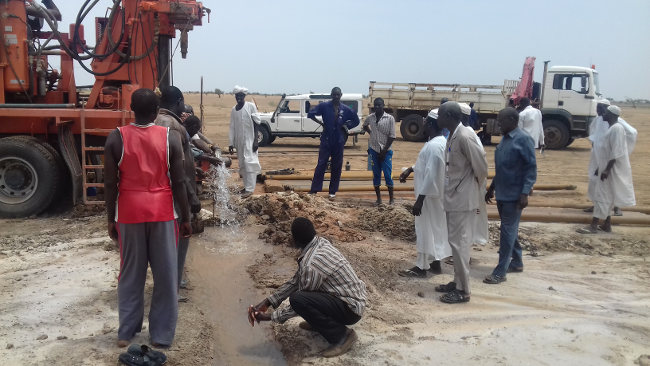
The drilling of a water well in North-Darfur, Sudan (photo: ZOA).
What does this indicator mean?
A lack of (equal access to) basic services, such as education and water, is often a root cause of instability, conflict or irregular migration.
This indicator shows to what extent drinking water schemes or water points, established with support from the Netherlands, are used by the intended beneficiaries.
What does the result mean?
A high percentage of local conflicts in countries like Somalia, South Sudan and Ethiopia stems from disputes over access to natural resources like water.
To stimulate equal access to and use of improved water sources in ways that increase local stability, the Netherlands is supporting NGOs, the African Development Bank and the World Bank Group in their provision of capital, expertise and training to vulnerable people and (local) authorities.
In 2016, at least 444,000 people used new or improved water points in fragile and conflict-affected areas.





